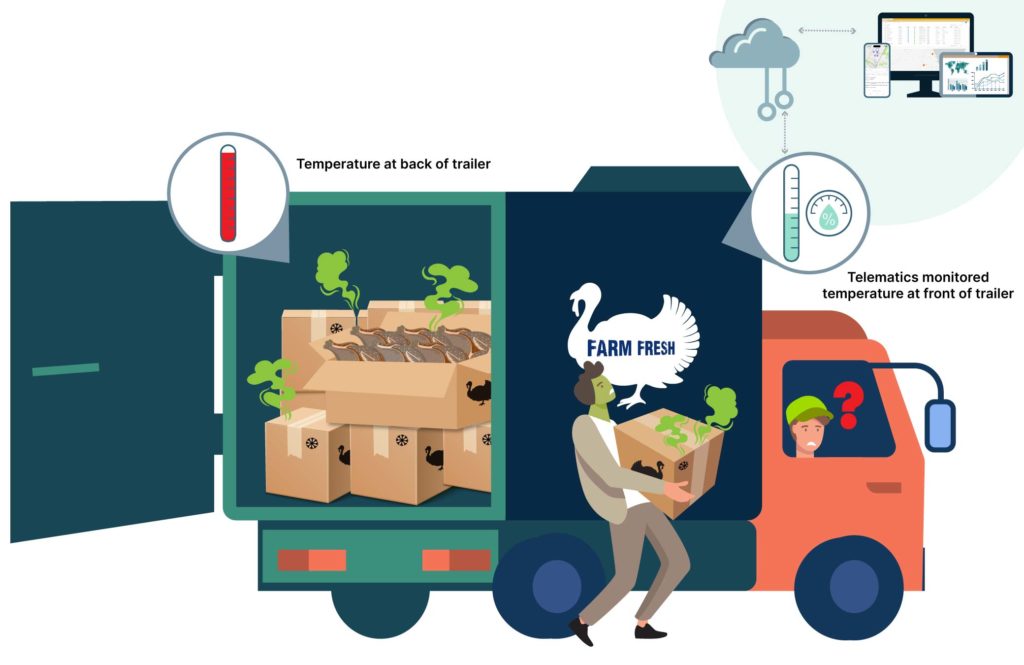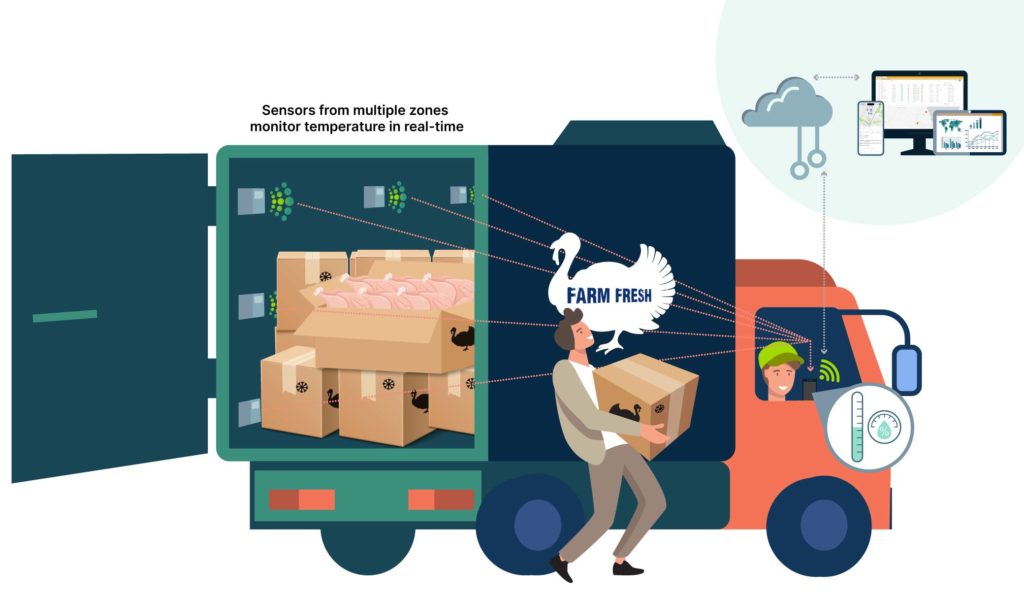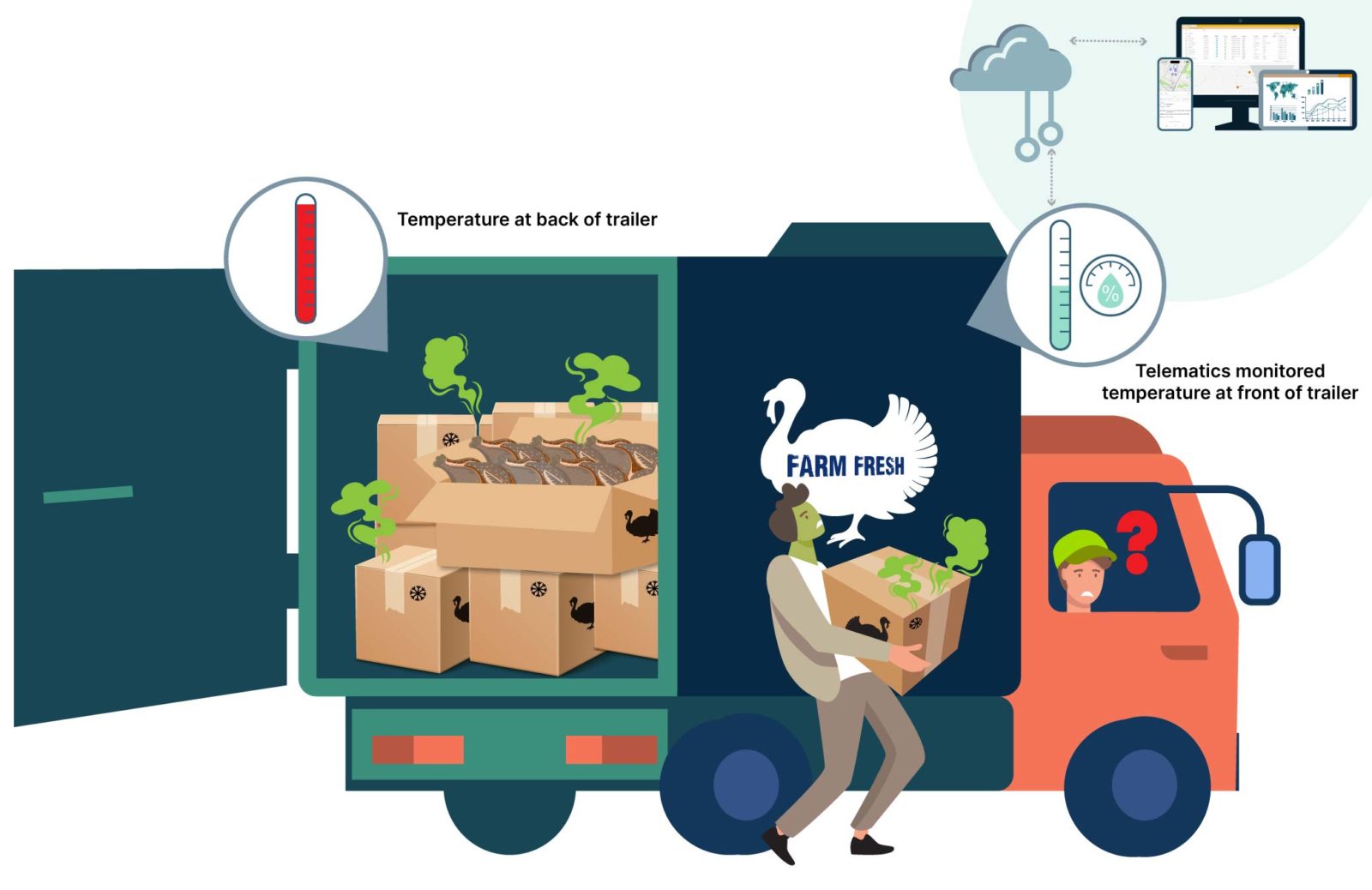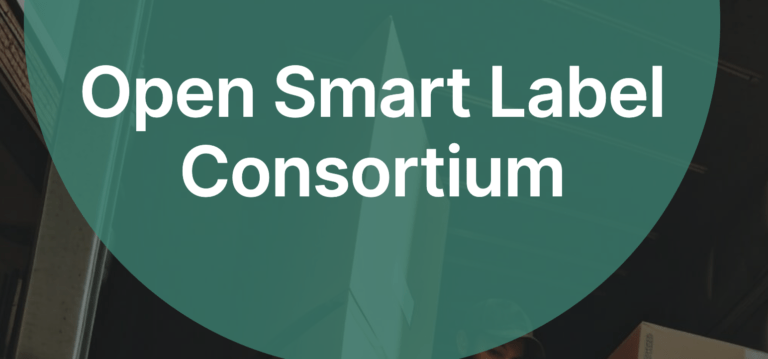Turkey Troubles: Addressing the Issue of Wasted Thanksgiving Birds
Every Thanksgiving, millions of Americans enjoy turkey, though many are wasted due to temperature-related issues in the supply chain. Why?
- Telematics limitations: Telematics only provide data on temperature within a zone of a trailer.
- After the fact awareness: Data loggers only tell you what’s happened in the trailer after arrival, while temperature issues need be addressed before spoilage.
Skip to solution or read the full article.
In 2018, Americans ate over 45 million turkeys on Thanksgiving. Moving that many birds would take approximately 13,500 trucks each hauling 50,000 lbs of turkeys. While most turkeys sold are frozen (90%), the remaining 10% are premium fresh turkeys. Fresh turkeys only have a 21-day shelf life, must be kept at 40 degrees Fahrenheit (4 degrees Celsius) to keep from spoiling, and need to be cooked within a couple of days after leaving the store. It’s a logistical challenge to make sure turkeys stay within food safety guidelines from the FDA, USDA, and FSIS (Food Safety and Inspection Services) throughout the supply chain from processing to shipping to warehouse to store.
Why are we still losing turkeys?
Refrigerated trucks are 50 feet long and have AC units front and back to keep things at 40 degrees. It’s not easy to keep something that big evenly cold end to end. Just like our homes, temperatures are tracked at the AC unit–just like your home thermostat–and so really cold at one end might only be mostly cold in the middle. And when the doors open, the end probably isn’t very cold at all.

* Uneven temperatures: Telematics devices only monitor conditions within a certain zone
* After the fact: Data loggers only provide details at the end of the trip–too late to address spoilage
To stay in compliance with HACCP (Hazard Analysis and Critical Control Points) standards, the temperature inside the trailer is often tracked with telematics or data logging hardware. When a driver starts their run, so does the tracking. Throughout the run, data is gathered on how cold (or not) the truck is. There are allowances for time out of refrigeration (TOR) and stops, but stopping too long, say loading or unloading, can trigger a Dwell Time Violation. When the truck is stopped with the doors open, you can’t keep the inside cold enough to prevent spoilage.
Real-time telematics data can be misleading when it comes to complying with Time Out of Refrigeration (TOR) conditions. Telematics devices typically measure temperature from a single zone of the trailer, which may not capture the real temperature in all sections of the truck. This means that even though information is provided in real-time, it only gives you a partial view of what’s happening inside.
On the other hand, transferring logged data via a USB stick after the fact may be too late to intercept a potential TOR violation during the route. If anything is suspect, the food must be inspected for spoilage. And “yeah it’s probably okay” doesn’t cut it in food handling. If there is a chance those turkeys got too warm, they must be thrown away.
Thousands of dollars of food wasted. And it happens all the time because both telematics devices and data loggers have limitations. Telematics provide real-time data but from a single zone, while data loggers only offer limited details after the delivery, when it’s too late to address temperature issues effectively.
Here’s a scenario of how a shipment of fresh turkeys wound up in the garbage and not on the table.
Telematic and Data Logger Shortcomings
A group of turkey producers specialize in selling fresh turkeys for specialty markets. Because the farmers want only the best product getting to dinner tables, they only supply to a few stores in their area. The farmers found a local cold transportation company that would pick up the turkeys and get them to stores.
The truck arrives for its first pickup of the day. The trailer is cold and the turkeys are quickly loaded from the cooler to the truck. It’s fast and efficient. The driver starts logging the temperature in the trailer.
But after that, things didn’t go as planned.
There were delays at almost every other stop and the doors were open longer than the driver would have liked. It takes a lot of time to get a 50-foot trailer back down to 40 degrees–even with AC units going full blast.
Unbeknownst to the driver, the AC unit in the back of the trailer was having circulation issues because the airflow is blocked by a few pallets. Cold air isn’t getting to the middle of the trailer.
The driver sees nothing wrong. The AC units are showing green on his panel and the thermostat is at 40 degrees. It’s only when he gets to the warehouse do they see–and smell–the problem.
At the warehouse, the driver hands the USB stick from the data logger to the warehouse workers. They start looking at the data while the turkeys are being unloaded. Someone notices some damage to some of the boxes and inspects it.
When they unwrap the pallet and open the box they know right away the turkeys here have spoiled and are sent to the garbage. But now, all the pallets around it have to be checked because they all feel warm. Because no one wants their names tied to the Great Salmonella Outbreak of Thanksgiving 2023, a lot of turkeys wind up in the garbage.
The data logging information showed the rear AC was struggling to keep to 40 degrees. It wasn’t bad, but because of everything else, the middle of the trailer was probably closer to 41 or 42 degrees.
The store’s order is hundreds of turkeys short. The producers have lost credibility. The insurance companies have lost money. And the trucking company is getting blamed. This has not been a happy Thanksgiving for anyone.
Food wastage is a huge problem
Millions of dollars worth of food are wasted every year because of problems like this. Problems that could be avoided if there were sensors throughout the trailer–and even on the pallets themselves–sending real-time data to the driver, the trucking company, and the warehouse.
Until recently, deploying an array of real-time sensors was expensive and impractical. While small Bluetooth Low Energy (BLE) sensors have been around for a while, the hardware and software to gather and transmit the data has been expensive and cumbersome to deploy. While some large trucking companies might be able to afford to buy, deploy, and train drivers on sophisticated monitoring solutions, smaller companies, like the ones that move a lot of the groceries around the country, can’t. Small to mid-sized cold trucking companies can only afford basic data logging to comply with regulations.
But there’s a better way.
Luna XIO brings next-level real-time condition monitoring to everyone
Monitoring food conditions from multiple points within a trailer in real-time prevents food wastage. How?
- Real-Time: Affordable and durable sensors send information from multiple zones within a trailer in real-time to drivers and other stakeholders
- Zero-Touch Integration: Sensors communicate automatically with driver’s smartphones (no need for pairing)
- Early Warnings: Luna alerts drivers to temperature fluctuations so they can address issues before food safety becomes a problem
- Dashboard Visibility: Real-time dashboard assures compliance and peace of mind.
Read on for the full story.
Luna has developed technology that uses off-the-shelf, widely available BLE sensors to gather and securely send data in real-time everywhere it needs to be. Using the sensors and the hardware already in trucks, including a driver’s own smartphone, Luna’s zero-touch software can gather sensor data and send it to the cloud and then to trucking companies and customers without the driver having to change anything about their workflows.
Because these sensors are inexpensive, you can deploy them all around a trailer and even on the pallets themselves. You get 100% reliable and redundant condition data so at the first sign of trouble, something can be done before the fowl goes funky.

A win for producers and trucking companies
Let’s take the scenario above, but instead of data loggers only recording data at one point of the trailer, there are BLE sensors every 10 feet in the trailer and stuck onto pallets at every stop.
Before his run, our driver checks an app on his phone and confirms the temperature in the empty trailer is cold enough. All the sensors are reporting in and it looks good. The first stop goes as planned and he puts sensors on a few of the pallets as they are loaded. They are simple peel-and-stick sensors that turn on automatically and immediately become part of the sensor network. The driver doesn’t have to configure anything, it just works. He’s got his final load and is heading to the local grocery store’s depot.
Thirty minutes into the drive he gets a warning on his phone. One section of the trailer is getting too warm. He pulls off the road and opens the trailer. Someone had blocked the airflow at the back AC unit. He moves things around, the airflow is better, and the temperature is coming down. He notices one pallet got a little banged around and puts a special sensor on it so it can be quickly found and inspected while unloading.
His phone rings and it’s his supervisor. They saw the warnings on their automated dashboard too. The driver confirms it’s all fixed and sees temperatures are going down quickly. Everyone can see the temperature dropping in real-time and in compliance with regulations.
He gets to the depot and the warehouse already has all the data. The damaged pallet is quickly found, separated, and inspected. A couple turkeys go in the garbage because their packaging was damaged, but the rest are fine.
Ever since this trucking company deployed the Luna solution, which only took a couple days and cost much less than other systems, they’ve been able to win more contracts because they can give everyone peace of mind that their produce, from asparagus to zucchini, will get to customers fresh and safe.
Get a demo and consultation
This isn’t science fiction, Luna XIO is being deployed at companies just like in these scenarios. Learn more about Luna XIO’s supply chain visibility solutions or schedule a free consultation today.






